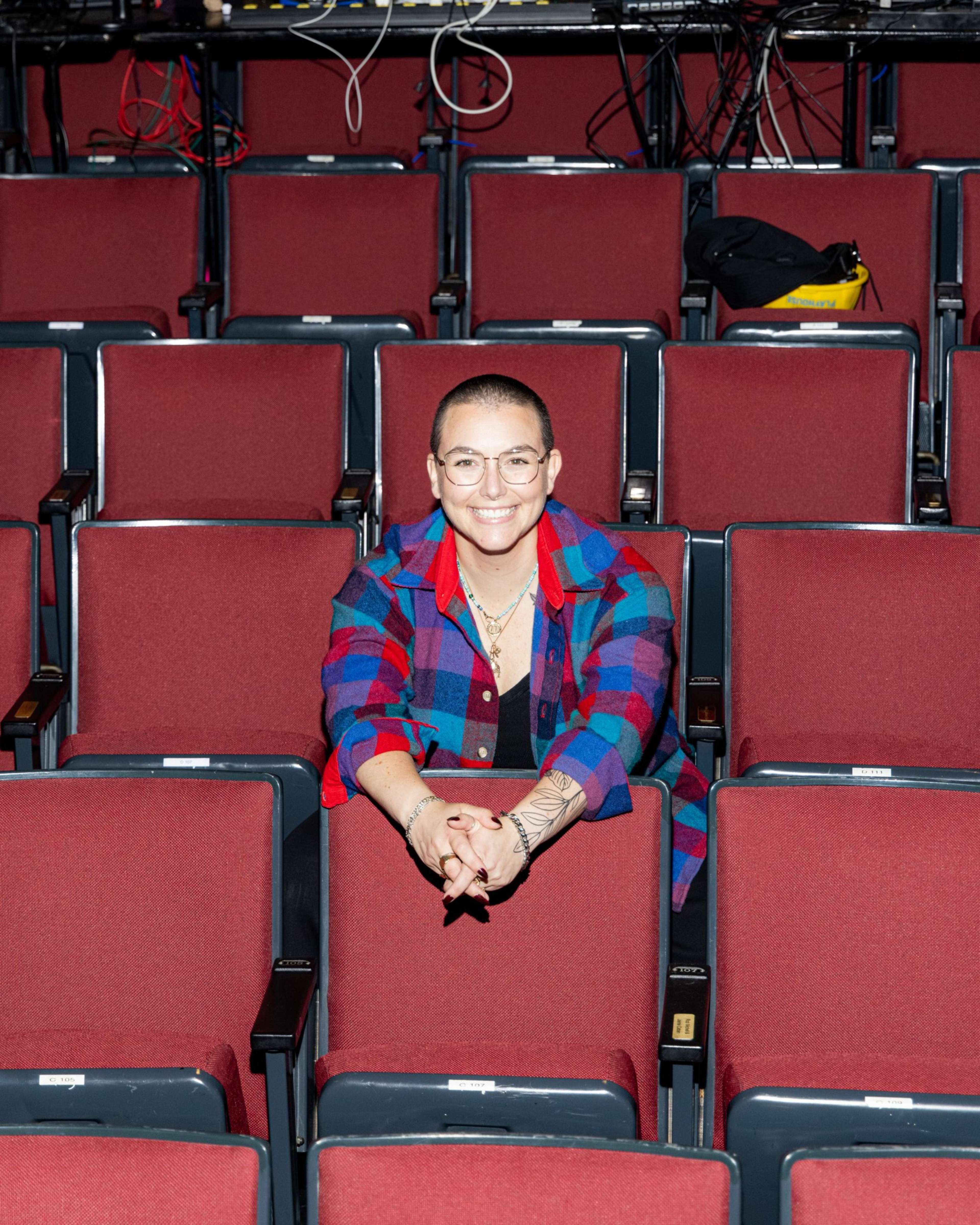This is Trade Secrets, a new series from The Standard that features unusual or unsung jobs around the city. Have a tip or suggestion? Email reporter Jillian D’Onfro at [email protected].
At a recent rehearsal at the SF Playhouse, Chelsea Pace strutted dramatically across the stage before appearing to bonk into a support beam. She clownishly slipped on spilled liquor, collapsed onto a sofa, and slid down a wall as if concussed.
But for all her theatrics, Pace isn’t an actor. Her buffoonery is precisely executed and instructional: As the company’s movement coordinator, she’s responsible for guiding performers safely through a production’s stunts, fights, and intimate moments. And the theater’s upcoming show, “The Play That Goes Wrong (opens in new tab),” has plenty.
“There are a lot of people that get hit in the face with a door — and that’s not a spoiler,” Pace, a Bay Area local, said with a laugh.

The show revolves around the opening night of a whodunit play that quickly falls apart. The actors play characters who are actors playing characters — all of whom are desperately trying to salvage the show.
“It’s super meta and also deeply silly,” Pace said. “It’s not serious, but we’re taking it seriously.”
One example? The deceptively simple spit take. The key for that bit of physical comedy is having little liquid in your mouth and spraying versus spitting, she explains (a diffuse spatter of water shows up better onstage).
Pace’s job brings discipline to slapstick moments and deliberate choreography to seemingly spontaneous kisses. She can teach actors how to distribute their weight for a fall (large muscle groups, like the glutes, can absorb more impact) or bounce backward convincingly when socked in the face. She can also guide an in-scene couple through the logistics of specific, desexualized movements that can simulate wriggling together sensuously.
While the use of a professional to coordinate fight scenes has long been the norm for plays, movies, and films, the surge of interest (opens in new tab) in intimacy coordinators has ties to the #MeToo era, as Hollywood reckoned with its history of abuses on set. Pace wrote a book (opens in new tab) about best practices for staging sex scenes and other steamy moments and has earned credit on films, TV shows (opens in new tab), and Broadway productions (opens in new tab).

With each new gig, she carefully pores over the script and makes notes in a spreadsheet about where she can lend her skills. In practice for “The Play That Goes Wrong,” that means teaching techniques to the cast on how to mime a sucker punch or smack safely into a wall, while also leading check-ins once rehearsals start rolling.
On set at the Playhouse, she alternates between sitting rapt in the theater and leaping onstage to drill into the mechanics of a trick or suggest a gag. She peppers interactions with actors with questions about their consent or physical needs: “Do you feel good trying that?” “Can I run something by you?” “How did that feel?”
Pace works with actors to understand their abilities or limitations and adapts their scenes accordingly. Some in-play catastrophes can be fully faked (a stumble or fisticuffs, for example); others require finding ways to minimize the impact — like when an actor must crash to the floor. Because the performers will be putting on the show eight times a week for seven weeks, they need to find ways to carry out stunts that don’t turn them black and blue.
“A lot of the work is physically demanding, it’s uncomfortable,” she said. “It’s akin to going on a run for an hour and a half, but they’ve trained for it, and we’ve found versions that aren’t going to exacerbate existing injuries or physical needs.”
This is the second show she has worked on with director Susi Damilano at the SF Playhouse, after last season’s “The 39 Steps,” which also involved comedic stunts.
“What you get with Chelsea is a professional clown, an intimacy choreographer, and a fight-slash-stunt director,” Damilano said. “Having her makes everything run easier, for peace of mind and for the play itself.”

Pace often finds ways to incorporate actors’ special talents to amp up a scene, whether someone’s getting hoisted out a window or making a grand entrance. The “ridiculous flexibility” of one actor — who was trained as a dancer— turned into splayed splits that heightened a scene.
Because “The Play That Goes Wrong” involves many props — “the set is a character in and of itself,” Pace explained — actors have to learn how to handle, say, a spring-loaded shield or a smoke machine.
Onstage with the performers, she leans into big expressions, hams up her physical comedy, and doles out praise generously when an actor nails a bit or pulls off a perfect pratfall.
The rehearsals meld her technical prowess and ability to improvise — and they’re a good time: “This thing doesn’t work if you don’t have actors who are down to clown.”
“The Play That Goes Wrong (opens in new tab),” Sept. 21 through Nov. 9 at SF Playhouse (450 Post St.).
